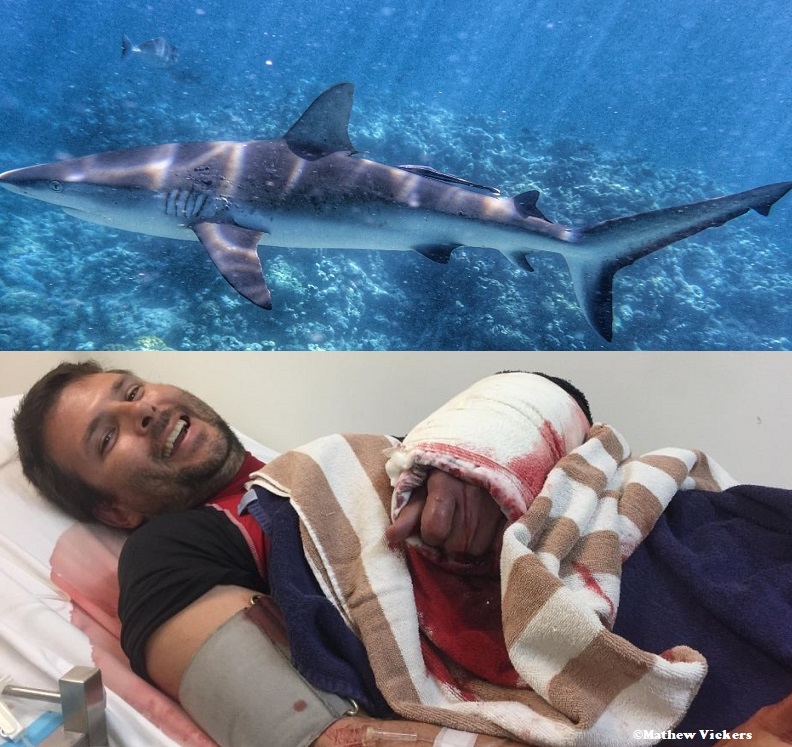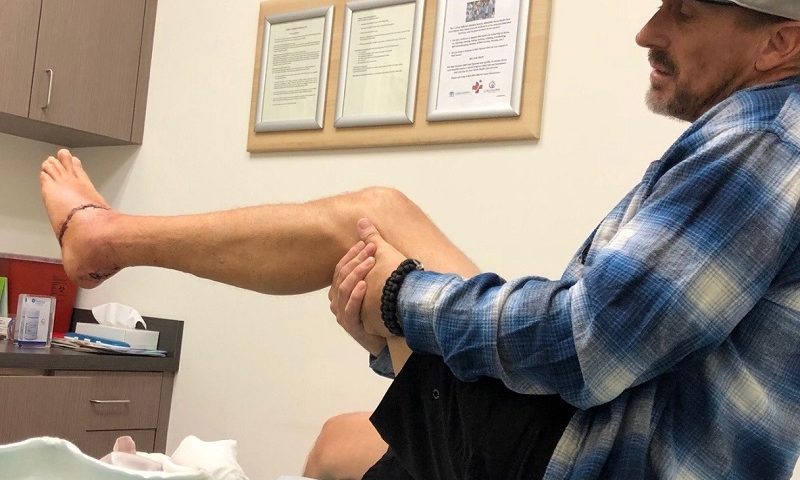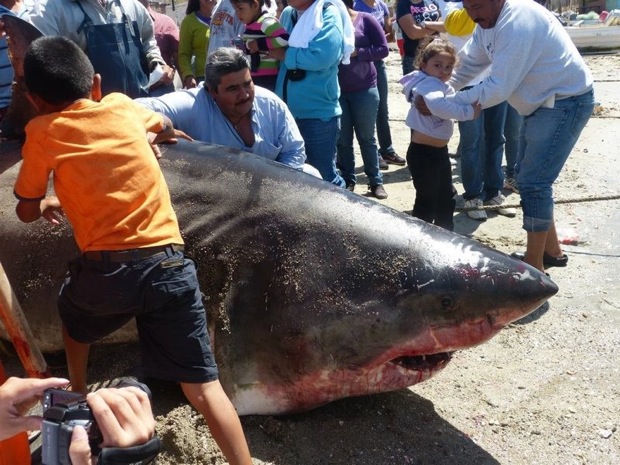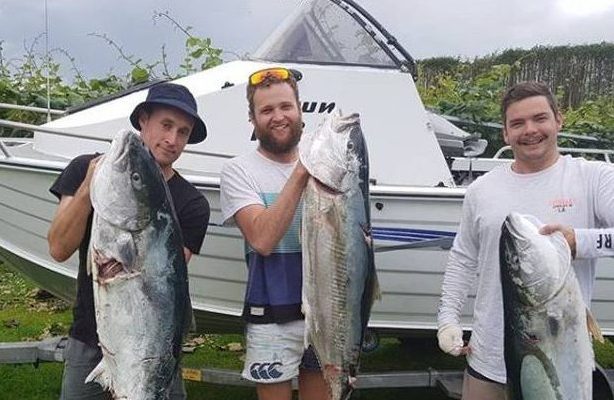A volunteer researcher was bitten by a shark on the Great Barrier Reef January 14.
Mathew Vickers was volunteering with James Cook University (JCU) researching the recovery rate of coral after a bleaching event on the reef.
The group was 37 to 49 miles off Lizard Island in Queensland snorkeling in an approved area.
Around 3 p.m. as the group was feeding red bass and cod, a bass took a bit of food and swam past Vickers, who believes the fish was using him as shelter.
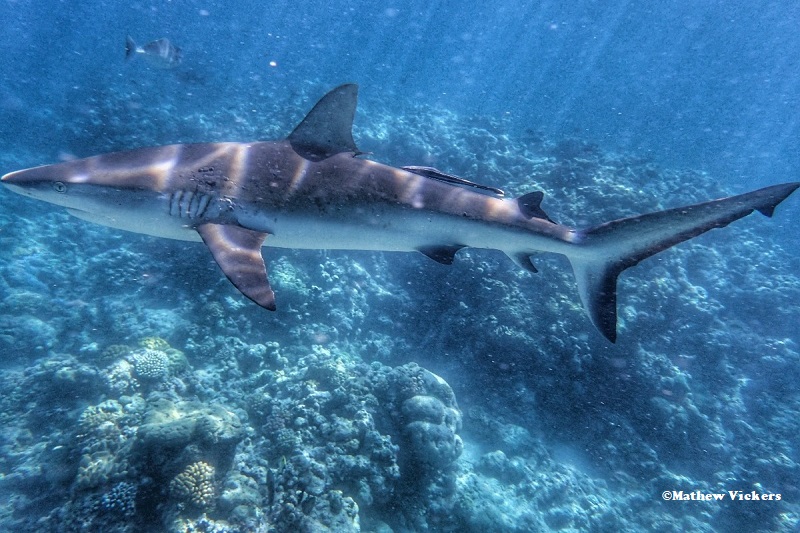
“It all happened very quickly: out of the corner of my eye a grey flash. A blur, really, and a 2m (6.56 ft) grey reef shark slammed into me,” Vickers posted on GoFundMe.
He was able to put his dominant left arm up to protect his face (Graphic Image).
“A quick hit. A big hit. Really hard, maybe like being hit by a car. But underwater. A moment of confusion and disbelief,” He said adding “I pulled back, and the shark pulled back, and then I was surrounded by blood and fatty tissue floating in the water column.”
He lifted his arm (Graphic Image) out of the water. “My hand curled involuntarily into a ball and I felt the tendons pull up into my arm; all my extensor tendons were severed. I managed to swim over and climb into the boat, and not drop the video camera I was holding in my right hand.”
Vickers sounded the alarm, warning others to exit the water and then surveyed his injury. “I looked at my arm, where a 40x5cm chunk had been ripped out, flapping open, bleeding, pulsing and twitching.”
A tourniquet was applied, and the boat was headed back to Lizard Island within seven minutes.
“The people around me managed to keep it together, marshal everyone, get the boats moving, and save me from bleeding out on the deck of a research tinny, 100km out to sea.”
Once back on the island an ex-paramedic adjusted the tourniquet as Vickers waited on medical transport.
Nearly 4 hours after the initial bite, a doctor from the Royal Flying Doctors unbuckled Vickers tourniquet.
“My head swam, and after a bit of a spike, the pain dropped, and I could think again. The relief was so immense that I swear I would have married that guy, had he asked. I was to find out later that it was a brave act by the doctor: at 4 hours, enough toxins have built up in a tourniqueted limb that amputation is compulsory.
“The reason is that removing the tourniquet causes the built-up toxins, mostly potassium, to flood back into the body, directly to the heart, causing massive heart attack.”
The reptile biologist received 50+ external and 40 internal stitches to repair his wound.
“I asked JCU and their insurer to help cover the medical costs while I recuperate. Unfortunately for me, a sealed, internal, investigation by JCU found that as I was a volunteer with JCU, I was neither a worker, nor was I working, and we weren’t at a work site. And, long story short, I am ineligible for typical protections afforded to salaried workers . . . Ultimately, I think that people who are volunteering for research shouldn’t have to end up on GoFundMe to pay for recovery after they’re hurt on a field trip.”
Vickers’ GoFundMe page has exceeded the initial goal of $20,000. Which is a good thing since he believes there is a good chance he will need more surgery.
James Cook University has issued a statement concerning the incident:
“Mathew Vickers was engaged as a volunteer at the time of the incident. Workcover assessed the incident and found Mathew Vickers wasn’t an employee of the JCU and therefore wasn’t entitled to Workcover. Workplace Health and Safety Queensland were also notified of the incident, made enquiries, and found no further action was required.
At the time of the incident, some of the field trip participants were taking part in snorkelling, which was not part of the planned field trip. Despite that, and despite the fact that he was a volunteer at the time, JCU has provided support to Mr Vickers.
In the immediate aftermath of the incident, a JCU Rehabilitation coordinator contacted Mathew Vickers to offer support and assistance, including trauma counselling, as the University was concerned about his health and well-being. JCU also provided assistance with filing a claim through the University’s insurer, and the University continues to offer Mathew Vickers the option of trauma counselling.”
There have been a total of 31 shark attack bites* in 2018, 0 of which were fatal**; 4 were reported in the US, with 0 occurring in Florida and 2 in Hawaii. Thirteen have been reported in Australia, none of which were fatal. Four unconfirmed worldwide and not included in the total count.
All locations have been marked on the 2018 Shark Attack Bites Tracking Map.
*Eight with no injury
**One possible scavenge
